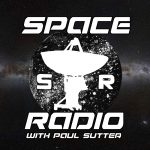Podcaster: Paul M. Sutter
 Title: Space Radio: Ep. 24: Quantum Space Computers
Title: Space Radio: Ep. 24: Quantum Space Computers
Organization: INFN Trieste and OSU CCAPP
Link : Twitter @PaulMattSutter, http://www.Facebook.com/PaulMattSutter, and http://www.pmsutter.com/spaceradio-archive/
Support the show: http://www.patreon.com/pmsutter
YouTube: http://www.youtube.com/c/PaulMattSutter
Description: Today’s topics:
- Nobody wins the moon (yet),
- what problems can we solve with quantum computers,
- is it safe to contact aliens,
- do all black holes spin,
- Mike Brown in the house,
- and of course listener questions!
Join Atacama AstroTour
Bio: Paul Sutter received his Ph.D. in Physics from the University of Illinois at Urbana-Champaign as a Department of Energy Computational Science Graduate Fellow. He then spent three years as a Postdoctoral Fellow in Next-Generation Cosmic Probes at the Paris Institute of Astrophysics, and is currently an INFN Fellow in Theoretical Physics in Trieste, Italy, and a Visiting Scholar at the Ohio State University’s Center for Cosmology and Astro-Particle Physics. He is inexplicably drawn to positions with very long titles.
Today’s sponsor: This episode of “365 Days of Astronomy” is sponsored by — no one. We still need sponsors for many days in 2017, so please consider sponsoring a day or two. Just click on the “Donate” button on the lower left side of this webpage, or contact us at signup@365daysofastronomy.org.
End of podcast:
365 Days of Astronomy
=====================
The 365 Days of Astronomy Podcast is produced by Astronomical Society of the Pacific. Audio post-production by Richard Drumm. Bandwidth donated by libsyn.com and wizzard media. You may reproduce and distribute this audio for non-commercial purposes. Please consider supporting the podcast with a few dollars (or Euros!). Visit us on the web at 365DaysOfAstronomy.org or email us at info@365DaysOfAstronomy.org. This year we will celebrates the Year of Everyday Astronomers as we embrace Amateur Astronomer contributions and the importance of citizen science. Join us and share your story. Until tomorrow! Goodbye!

